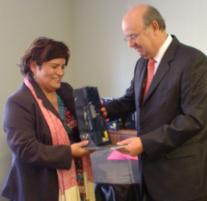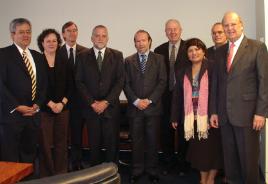Uni helps worldwide update of electronic health records platform
Published on 05 June, 2007
Central Queensland University is helping to champion the latest worldwide update of the openEHR Foundation's comprehensive health computing platform.
The openEHR Foundation's health computing platform provides the basis for future-proof, sharable electronic health records (EHRs).
CQU has most recently led the spread of this platform in Chile where a team led by Professor Evelyn Hovenga has signed agreements with major stakeholders of the Chilean Health system such as hospitals, universities and the health ministry. The Australian university recently (May 24) accepted a delegation from Chile's DoucUC (Professional educational institute) and the Chilean Ambassador, at its Sydney International Campus, in order to launch a new relationship to further this type of work.

CQU representative Dr Carola Hullin with DuocUC Rector Dr Marcelo Von Chrismar
openEHR architecture, using innovative 'Archetype' technology, allows information of a highly varied (and variable) nature to be collated in one or more health record repositories without compromising interoperability. Clinical documentation standards can evolve.
The openEHR is the work of a core team from Ocean Informatics, Australia, and University College London (UCL), England, with additional support from another 20 or so dedicated information and health professionals, as well as the openEHR community of around 1000 members from 70 countries. It builds on work done in numerous projects funded by the European Commission and the Australian government.
Ocean Informatics bases all of its core tools and technologies on openEHR and has recently established a presence in London due to growing European interest.
In the United Kingdom, the National Health Service is using the openEHR methodology and Ocean's toolset to build archetypes and templates for national use. A similar approach is under formal assessment in Scotland and Denmark.
openEHR is truly global in application because it has inbuilt multi-lingual support. The Ocean tools are currently available in English, Spanish, Turkish, Dutch, Swedish, Danish and German and are being used or assessed in many countries around the world.
Applications built to use this non-proprietary specification enable the movement of all or part of a person's health information from professional to professional as required.
The specification also caters for patients carrying their own personal health records if they have reason to be concerned about privacy.
openEHR provides the key semantics of the new European EHR Extract standard 2, including its archetype language, ADL, which will also soon become an ISO standard.
In Australia, the openEHR architecture was initially tested in the HealthConnect Trials in Queensland with a further pilot implementation beginning in rural Victoria.
An openEHR health record ensures that information collected at one site may be shared and processed at any other point of care. This offers the prospect of true interoperability in the health care environment - a long-term goal of Health Departments and Governments globally and one that has already attracted huge amounts of funding in many parts of the world.

CQU rep Dr Carola Hullin (third from right) with - left to right - Dr Jorge Gonzalez (DuocUC); Dr Heather Lesley (Ocean Informatics); Dr Vincent McCauley (CQU Adjunct Professor); CQU Sydney Director Geoff Wessling; Jose Luis Balmaceda (Chilean ambassador); Professor Richard Madden (National Centre for Classification in Health Director); Ognian Pishev (Ocean Informatics) and Dr Marcelo Von Chrismar (DuocUC Rector).

